Mirza Ghalib Poetry, a name synonymous with Urdu poetry, transcends time and borders. Born Mirza Asadullah Khan in 1797. He adopted the pen names Ghalib and Asad, etching his way into the literary hall of fame. But Ghalib was more than just a poet.
تم جانو، تم کو غیر سے جو رسم و راہ ہو
مجھ کو بھی پوچھتے رہو تو کیا گناہ ہو
तुम्हें पता है, दूसरों के साथ तुम्हारे जो भी रीति-रिवाज़ और परंपराएँ हैं,
अगर तुम मुझसे भी पूछते रहोगे, तो पाप क्या है?
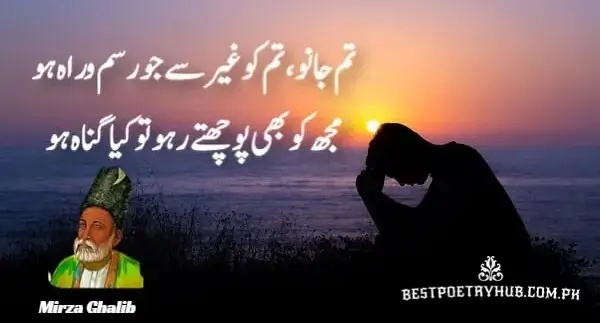
Tum Jaano, Tum Ko Ghair Sy Jo Rasm-o-Raah Ho
Mujh Ko Bhi Poochty Raho To Kia Gunaah Ho
He was a product of his tumultuous times, a witness to the twilight of the Mughal Empire and the rise of the British Raj. His life and work reflect a complex tapestry woven with love, loss, rebellion, and philosophical musings.
یہ مسائل تصوف یہ تیرا بیان غالب
تجھے ہم ولی سمجھتے جو نہ بادہ خوار ہوتا
सूफीवाद के इन मुद्दों पर आपका कथन हावी है।
हम आपको एक संत मानते हैं जो विपत्ति से नहीं डरता।
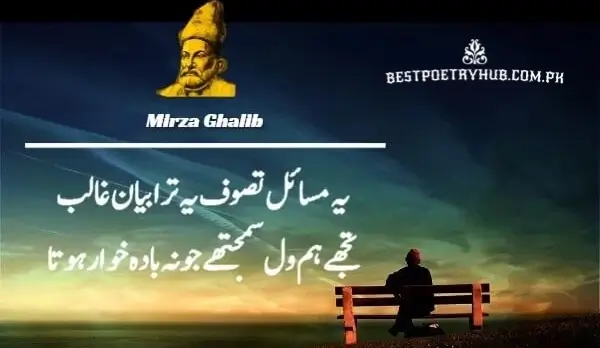
Yeh Masaayel Tassawuf Yeh Tera Byaan Ghaalib
Tujhe Hum Wali Samjhtay Jo Na Baada Khwaar Hota
Mirza Ghalib Poetry In Urdu Text
Ghalib’s early life was steeped in privilege. Descended from Turkic nobility, he received a thorough education in Urdu, Persian, Arabic, and Turkish. He mastered calligraphy and became proficient in the art of letter-writing, a skill that would serve him well in later years.

Aaah Ko Chahiye Ik Umar Asar Hone Takk
Kon Jeeta Hy Teri Zulf K Sarr Hone Takk
However, by the time he reached adulthood, the Mughal Empire was crumbling. The political instability and financial hardship that ensued became a recurring theme in his poetry.
ہوئی مدت کہ غالب مرگیا پر یاد آتا ہے
وہ ہر اک بات پر کہنا کہ یوں ہوتا تو کیا ہوت
ग़ालिब को आखिरी बार देखे हुए काफ़ी समय हो गया है। मुझे याद है
वो हर एक बात पर कहते थे, “अगर ऐसा होता तो क्या होता?”
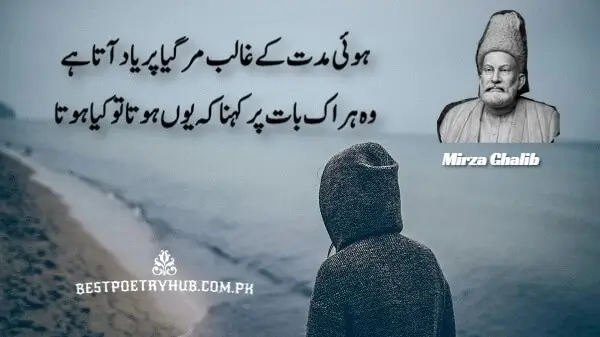
Hui Muddat Keh Ghaalib Marr Gya Par Yaad Aata Hay
Woh Har Ik Baat Per Kehna Keh Youn Hota To Kia Hota
Mirza Ghalib Best Poetry In Urdu
Ghalib’s primary form of expression was the ghazal, a genre known for its lyrical beauty and emotional intensity. He breathed new life into the ghazal, employing a unique style that was both intensely personal and universally relatable.

Mehrbaan Ho k Bulalo Mujhe Chaaho Jiss Waqt
Main Gyaa Waqat Nhi Houn K Phir Aa Bhi Na Sakoun
His verses explored themes of love and loss, the fleeting nature of life, the pain of separation, and the search for meaning. He wasn’t afraid to be playful, often using irony and wit to add depth to his observations. You Will Also Please to read more Mir Taqi Meer Poetry.
کیوں جل گیا نہ تابر رخ یار دیکھ کر
جلتا ہوں اپنی طاقت دیدار دیکھ کر

Keun Jall Gyaa Na Taabar Rukh-e-Yaar Dekh Kar
Jalta Houn Apni Taaqat-e-Deedar Dekh Kar
Mirza Ghalib In Urdu
Mirza Ghalib Ghazal In Urdu’s was not without its share of personal tragedies. He lost seven of his eight children, a fact that undoubtedly shaped his world view.

Mohabbat Main Nahi Hy Farq Jeeny Aur Marne Ka
Ussi Ko Dekh Kar Jeete Hain Jiss Kafir Pe Damm Nikle
These losses are echoed in some of his most poignant verses, where he grapples with grief and questions the meaning of existence.
دشمنی ہوچکی بہ قدر وفا
اب حق دوستی ادا کیجئیے

Dushmani Ho Chuki Ba Qadr-o-Wafa
Ab Haqq-e-Dosti Adaaa Ki Jiye
Beyond his poetry, Ghalib was also a skilled letter writer. His letters, known as “Urdu-e-Mualla” (Elevated Urdu), offer a glimpse into his personal life, his thoughts on politics and society, and his witty observations on everyday life. They reveal a man of sharp intellect and a keen sense of humor. You May Also Like to read Allama Iqbal Poetry.
جب کہ تجھ بن نہیں کوئی موجود
پھر یہ ہنگامہ اے خدا کیا ہے۔
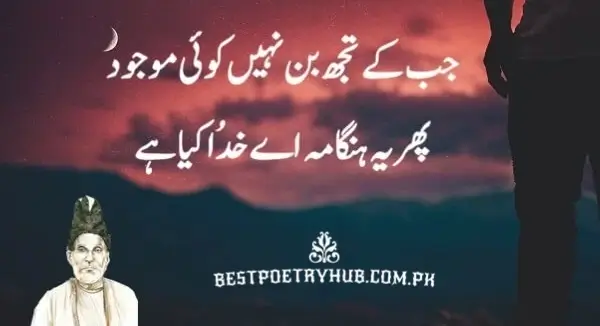
Jab Keh Tujh Bin Nahi Koi Mojod
Phir Yeh Hangaama Aye Khudaa Kia Hay?
Mirza Ghalib Poetry In English
Ghalib’s legacy extends far beyond the realm of Urdu literature. He is considered a pioneer of Urdu prose, and his use of everyday language helped to elevate the status of the language. His influence is felt not just in Urdu poetry but also in other forms of South Asian art, music, and cinema.
ہم کو فریاد کرنی آتی ہے
آپ سنتے نہیں تو کیا کیجئے
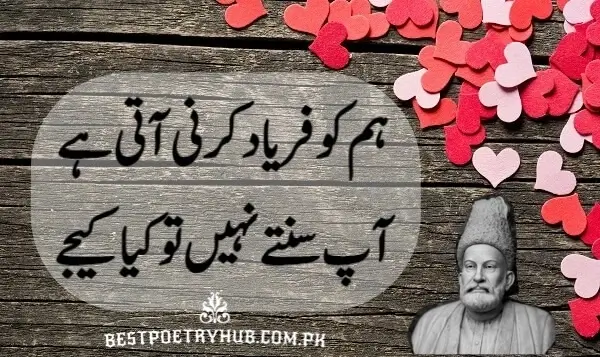
Hum Ko Faryaad Karni Aati Hay
Aap Suntay Nahi To Kia Ki Jiye..
Mirza Ghalib Poetry In Urdu 2 Lines
Today, Ghalib is celebrated as one of the greatest poets of the Indian subcontinent. His work continues to resonate with readers across the globe, offering timeless insights into the human condition.

Dukh De Kr Swaaal Krte Ho
Tum Bhi Ghalib Kmaal Krte Ho
His ability to capture the essence of love, loss, and the search for meaning ensures that his words will continue to inspire and challenge readers for generations to come.
رنج اٹھانے سے بھی خوشی ہوگی
پہلے دل درد آشنا کیجئے

Ranj Uthaanay Sy Bhi Khushi Hogi
Pehlay Dil Dard Aashnaa Ki Jiye

Be Khudi Be Sabab Nahi Ghaalib
Kuch To Hy Jisski Parda Dari Hy

Ghalib Bura Na Maan Jo Wayez Bura Kahe
Aisa Bhi Koi Hy K Sab Acha Kahen Jissy

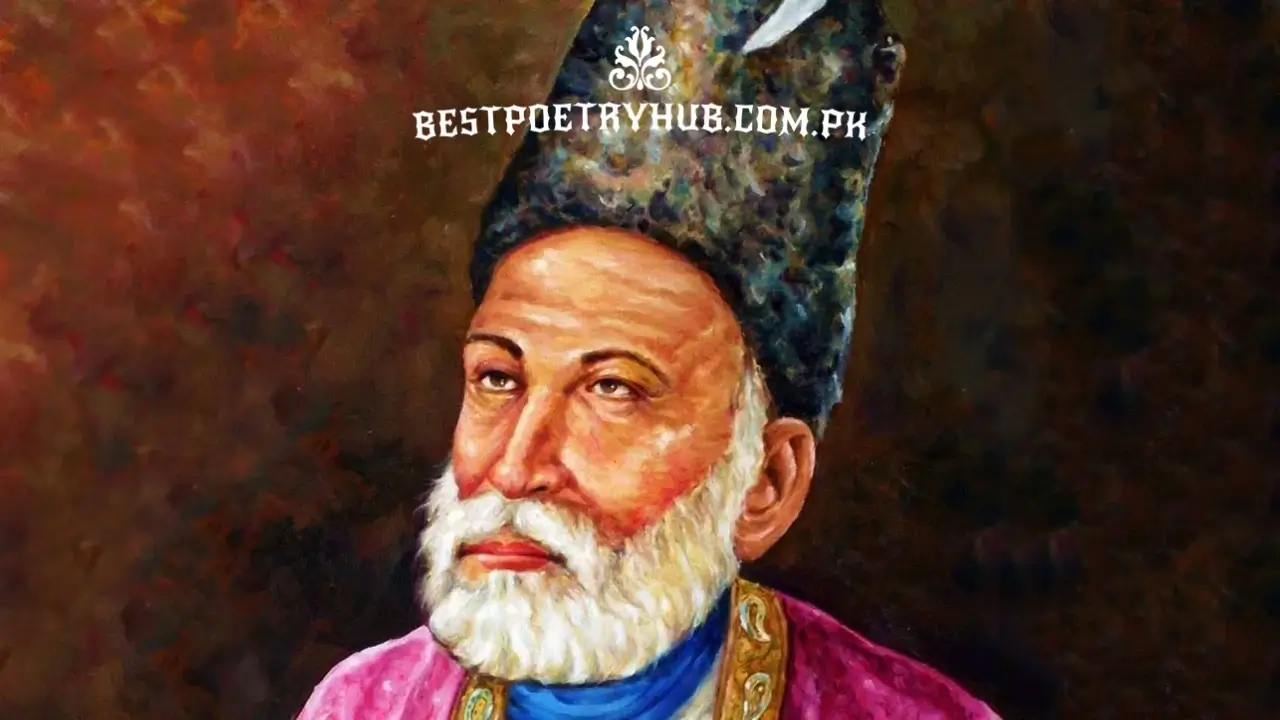
2 thoughts on “Mirza Ghalib Poetry in Roman Urdu & Hindi For Social Media DP”